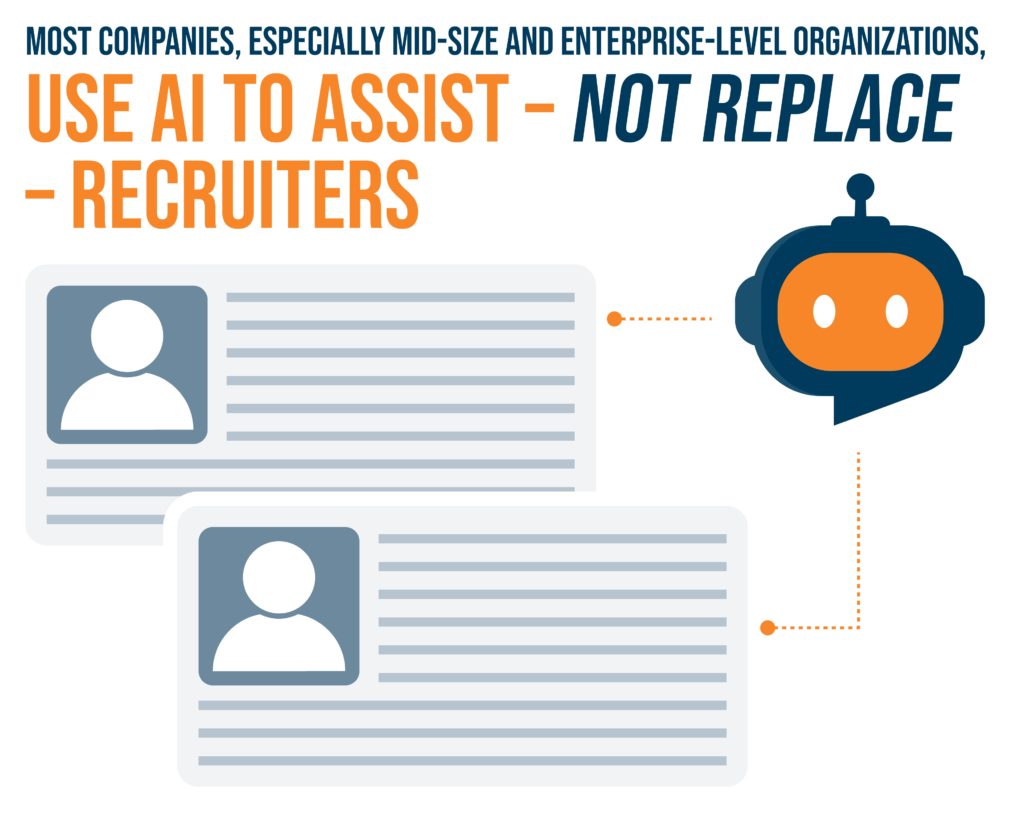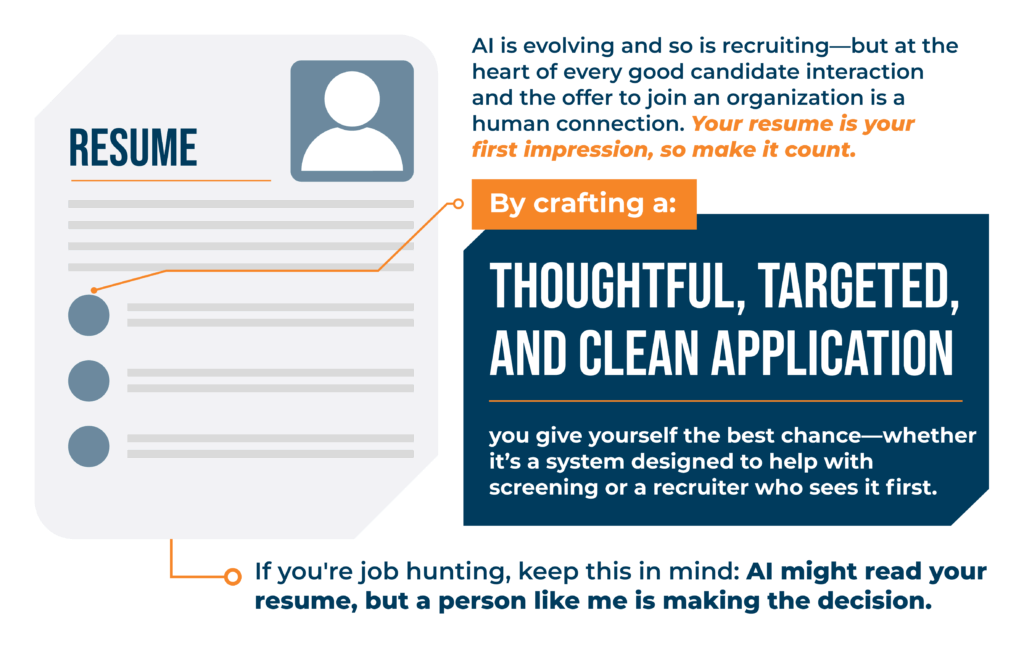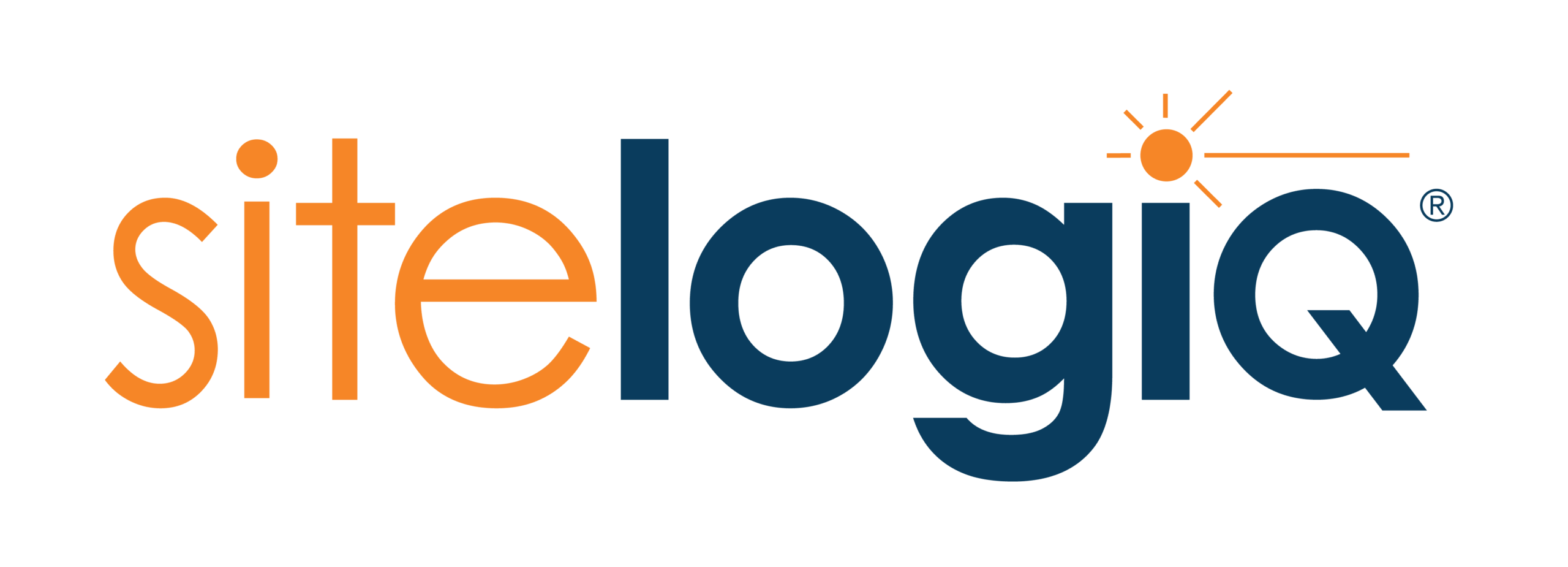In today’s tech-driven world, there’s a lot of noise surrounding artificial intelligence (AI) in hiring. You’ve likely read headlines like “Your Resume Will Never Reach a Human” or “AI Bots Are Deciding Your Career.” While it’s true that AI tools can and do play a role in modern hiring workflows, the reality is more nuanced—and less intimidating than you may think. Large and small companies may use screening tools, though often not at the same scale.
As someone in the recruiting field who sees thousands of applications a month, I want to clear up some misconceptions and share practical advice on how you can stand out, whether or not AI touches your resume first.
The Truth About AI in Hiring
AI is commonly used to streamline parts of the recruitment process, especially at the initial stages. As a recruiter, this saves us time—think resume parsing, keyword matching, and ranking tools that help me and my peers manage high volumes of applications for our job openings. But here’s an important takeaway: AI doesn’t make the final call. Humans do. Most companies, especially mid-size and enterprise-level organizations, use AI to assist—not replace—recruiters.

In fact, many resumes are reviewed personally by recruiters like me, especially those that make it past the initial screening or come through employee referrals, job or career fairs, or personal network connections. In these cases, AI isn’t even utilized at all.
Best Practices to Make Your Application Rise Above
Whether AI tools are involved or not in a hiring process, following some simple best practices will increase your chances of getting noticed by the recruiters working to fill open positions.
1. Tailor Your Resume for the Specific Job Description
Customizing your resume for each role is critical. Use keywords and phrases from the job posting—but do so naturally and without adding fluff. AI screening tools may flag relevant terms, but human recruiters are looking for substance and alignment with the role. We’re looking for quality.
2. Use a Clean, Simple, & Easy-to-Read Format
Over-engineered and oddly laid out resumes can confuse Applicant Tracking Systems and irritate human reviewers. Stick to clear headings (i.e., “Experience,” “Education,” “Skills”), standard fonts, and a reverse-chronological format. Make a simple introduction of yourself and your qualifications, and include why your experiences and success align with the role—think of this as your resume’s executive summary. Highlight key successes and include both hard skills (i.e., Python, Excel) and soft skills (e.g., leadership, communication).
3. Highlight Achievements, Not Just Duties
Instead of listing what you were responsible for, emphasize what you accomplished. Quantify results when possible: “Increased sales by 30% in Q1” is far more impactful than “Responsible for sales.”
4. Be Strategic with Keyword Use
Incorporate industry terms, tools, and skills relevant to the job—but avoid keyword stuffing. Recruiters can spot it, and it will hurt your credibility. Focus on meaningful context and how you used those tools or applied those skills to your role.
5. Don’t Rely Solely on the Portal
Leverage LinkedIn, professional networks, and employee referrals. Roll up your sleeves and get to work. A strong resume is critical, but building and fostering relationships are often the catalyst for getting noticed.
6. Apply Thoughtfully, Not Broadly
Mass applying can hurt more than help. It can signal desperation rather than genuine interest or alignment with a specific role. Recruiters value candidates who are intentional about the roles they pursue and can demonstrate the skills, experience, and proven success they bring with them.
7. Proofread Thoroughly—Errors Can Cost You
Your thoroughness and attention to detail are critical.
Key Takeaways & What to Keep in Mind
AI is evolving, and so is recruiting—but at the heart of every good candidate interaction and the offer to join an organization is a human connection. Your resume is your first impression, so make it count. By crafting a thoughtful, targeted, and clean application, you give yourself the best chance—whether it’s a system designed to help with screening or a recruiter who sees it first.
If you’re job hunting, keep this in mind: AI might read your resume, but a person like me is making the decision.

We know searching for a new job isn’t always easy, and we truly appreciate the effort you’re putting in. Keep striving to present your best self—we’re committed to doing the same on our end. Wishing you success in finding your next opportunity.







